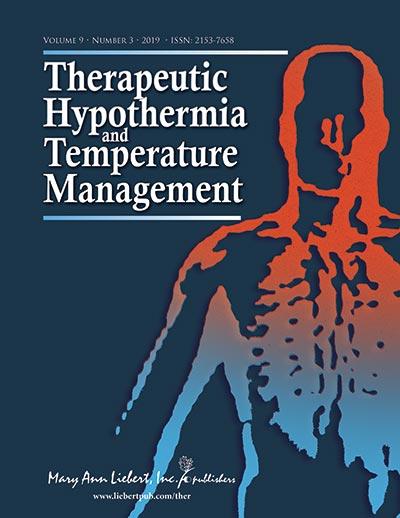
Credit: Mary Ann Liebert, Inc., publishers
New Rochelle, NY, November 5, 2019-Researchers showed that 20-50% of patients developed an irregular heartbeat that required defibrillation during the active cooling phase of therapeutic hypothermia following an out-of-hospital cardiac arrest. Only patients with cardiogenic shock developed malignant arrhythmias (MA), and the use of epinephrine in the context of intense cooling may increase the incidence of MA in patients with shock after cardiac arrest, as reported in Therapeutic Hypothermia and Temperature Management, a peer-reviewed journal from Mary Ann Liebert, Inc., publishers. Click here to read the full-text article on the Therapeutic Hypothermia and Temperature Management website until December 4, 2019.
The article entitled “Malignant Arrhythmias During Induction of Target Temperature Management After Cardiac Arrest” was coauthored by Christoph Adler and colleagues from University of Cologne and Ev. Klinikum Köln.Weyertal, Cologne, Germany. The researchers designed a study to identify predictors for the development of MA in patients with non-traumatic shock following out-of-hospital cardiac arrest. Risk factors for MA included a faster temperature decline and lower serum potassium levels during the cooling period. Nearly half of all patients developed ventricular tachycardia and 20% experienced MA during the first hours of hospital treatment, when the active cooling took place.
“The results of this prospective cardiac arrest study are important to the therapeutic hypothermia field because they indicate that standard treatments of shock in patients that undergo intense cooling may be pro-arrhythmic,” says W. Dalton Dietrich, III, PhD, Editor-in-Chief of Therapeutic Hypothermia and Temperature Management, Scientific Director of The Miami Project to Cure Paralysis, and Kinetic Concepts Distinguished Chair in Neurosurgery, University of Miami Leonard M. Miller School of Medicine.
###
About the Journal
Therapeutic Hypothermia and Temperature Management is the only peer-reviewed journal providing clinical advances, best practices, and protocols on this critical, life-saving technology, including its application in cardiac arrest, spinal cord and traumatic brain injury, stroke, and burns. The Journal is published quarterly online with open access options and in print. Complete tables of content and a sample issue may be viewed on the Therapeutic Hypothermia and Temperature Management website.
About the Publisher
Mary Ann Liebert, Inc., publishers is a privately held, fully integrated media company known for establishing authoritative peer-reviewed journals in many promising areas of science and biomedical research, including Journal of Neurotrauma and Brain Connectivity. Its biotechnology trade magazine, GEN (Genetic Engineering & Biotechnology News), was the first in its field and is today the industry’s most widely read publication worldwide. A complete list of the firm’s 90 journals, books, and newsmagazines is available on the Mary Ann Liebert, Inc., publishers website.
Media Contact
Kathryn Ryan
[email protected]
914-740-2250
Original Source
https:/
Related Journal Article
http://dx.




